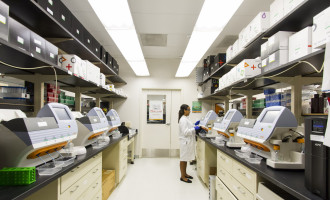
Insilico Medicine ("Insilico"), a clinical stage generative artificial intelligence (AI)-driven biotechnology company, announced the publication of a novel series of orally available covalent CDK12/13 dual inhibitors, as a potential option against refractory and treatment-resistant cancers.
Published in the Journal of Medicinal Chemistry (IF=7.2), the study showcases the discovery of compound 12b, a potent, selective, and safe therapy targeting CDK12/13, empowered by Insilico’s proprietary generative AI platforms including PandaOmics and Chemistry42.
As members of the cyclin-dependent kinases (CDK) family, CDK12 and CDK13 preferentially modulate DNA damage response (DDR) genes to maintain genomic stability, playing a significant role in tumorigenesis and the development of resistance to antitumor therapies.
Despite the therapeutic promise, attempts to inhibit CDK12/13 have faced challenges such as toxicity and inefficacy stemming from issues with prior covalent and non-covalent inhibitors.
To start with, Insilico Medicine leveraged PandaOmics, its proprietary AI-powered target discovery and prioritisation engine, to rank potential targets through multiomics and literature-based analyses, and CDK12 topped the list across datasets.
Following that, the indication prioritisation tools embedded in PandaOmics were utilised to reveal top priority indications for the selected targets, directing the research focus to cancer types including gastric cancer, ovarian cancer, prostate cancer, non-small cell lung cancer, liver cancer, triple-negative breast cancer (TNBC), and colorectal cancer.
Based on previous CDK12/13 inhibitors, Insilico research team used AI-guided structure-activity relationship (SAR) analyses and computational chemistry methods to produce a novel compound series with decreased unwanted off-target reactivity, improved oral bioavailability, and favourable inhibitory activity.
During the preclinical in vitro and in vivo testing, compound 12b demonstrated nanomolar potencies across cancer cell lines, desirable ADME properties.
Furthermore, 12b exhibited significant efficacy in breast cancer and acute myeloid leukaemia (AML) models, all without inducing intolerable side effects, paving the way for further therapeutic development.
"At Insilico Medicine, we hope to revolutionise the drug discovery process with cutting-edge artificial intelligence technologies, and the discovery of CDK12/13 dual inhibitors with potential to address treatment-resistant tumours is another step towards the promise," says Dr. Hongfu Lu, co-lead author of the study and Senior Director of Chemistry at Insilico Medicine.
"The research and development process showcases how AI-guided drug design can achieve both precision and safety in cancer therapeutics, and we are striving to advance the compound in this programme into clinical trials in the near future."
Source: InSilico Medicine